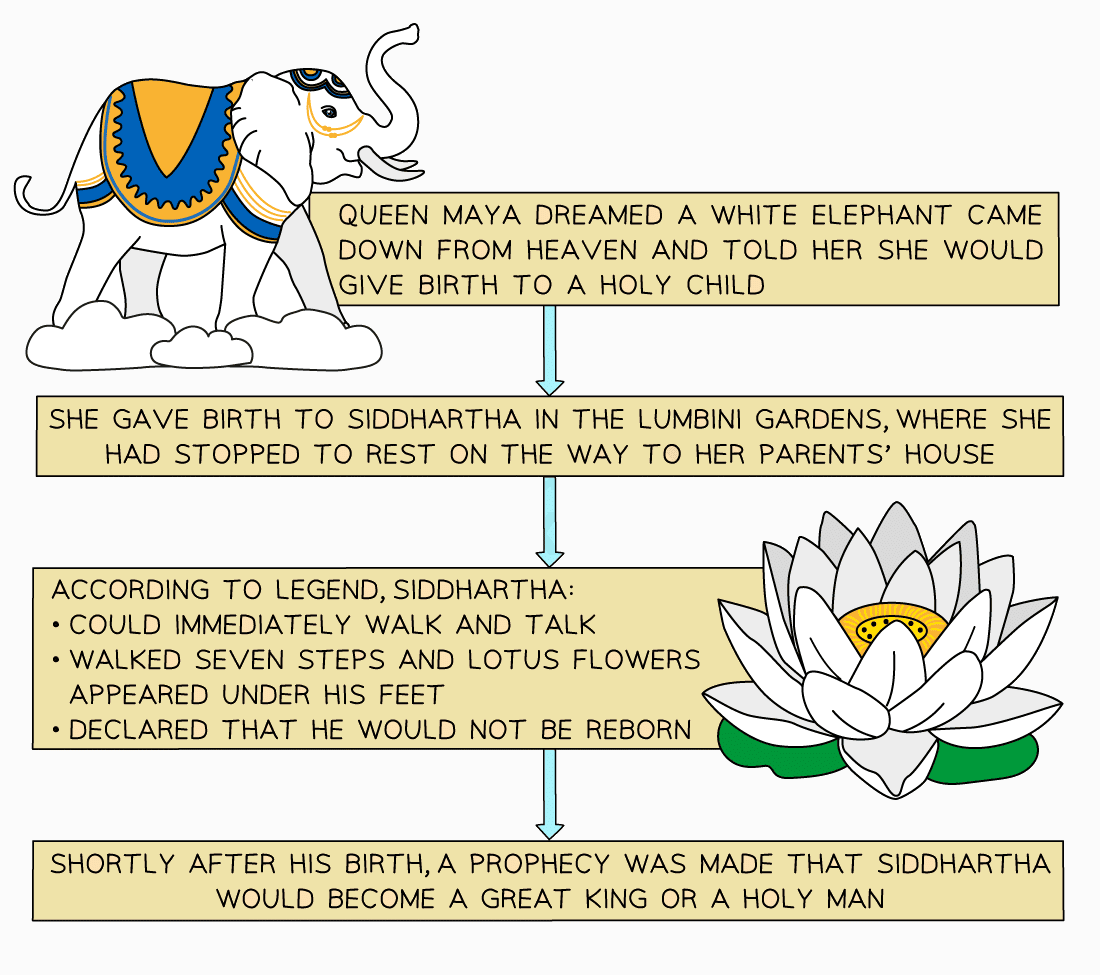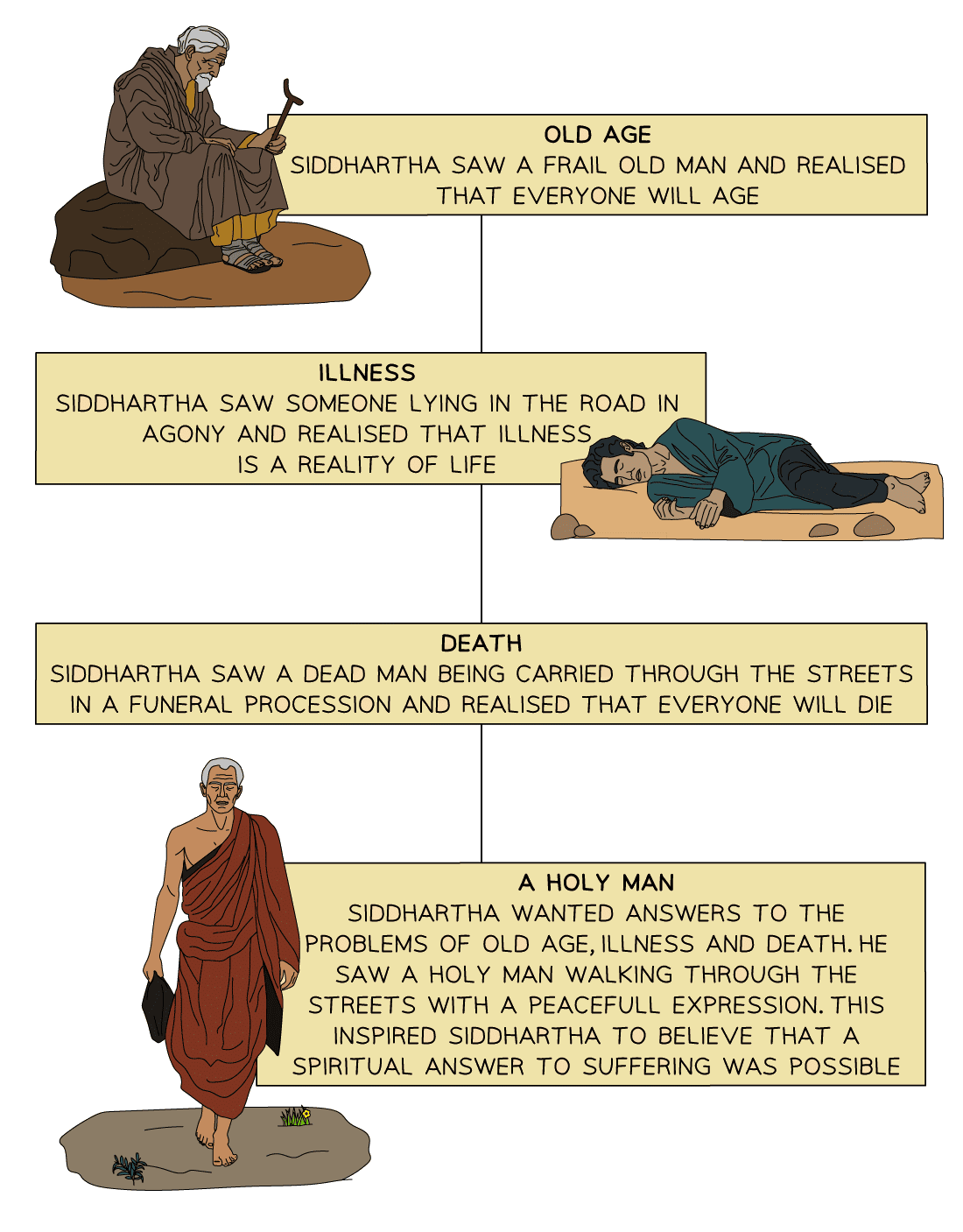The Buddha | Religion, Philosophy & Ethics for GCSE/IGCSE - Year 11 PDF Download
| Table of contents |

|
| The Birth of the Buddha |

|
| Siddharta’s Birth |

|
| Siddharta’s Luxurious Lifestyle |

|
| The Four Sights |

|
| The Renunciation or “Letting Go” |

|
The Birth of the Buddha
Buddhism was established approximately 2,500 years ago by Siddharta Gautama:
- Siddharta was born a prince around 500 BCE in southern Nepal.
- His parents were King Suddhodana and Queen Maya.
- The name Siddharta translates to “perfect fulfillment.”
- After achieving enlightenment, Siddharta became known as the Buddha.
- The term Buddha signifies “awakened one” or “enlightened one.”
Various sources provide details about the Buddha’s life:
- Since some accounts were documented centuries after his death, distinguishing fact from legend can be challenging.
- Nevertheless, for Buddhists, these legends and miraculous events convey significant spiritual truths.
- “From the queen’s side, her son was born without pain.” (Buddhacarita, line 25)
These extraordinary elements highlight Siddharta’s exceptional nature, inspiring Buddhists to follow his teachings.
Siddharta’s Birth

Siddharta’s Luxurious Lifestyle
Queen Maya passed away seven days after giving birth to Siddharta, so he was raised by his mother’s sister.
- He was brought up in a palace surrounded by extravagance.
- “I was raised with great care…” (The Buddha in the Anguttara Nikaya, vol. 1, p.145)
Buddhist sacred texts describe Siddharta’s lavish lifestyle:
- He had three palaces (one for winter, one for summer, and one for the rainy season).
- A canopy was constantly held over him to shield him from the elements.
- Musicians and dancers entertained him.
- He wore the finest garments, ate gourmet food, and received an elite education.
Siddharta’s father, mindful of a prophecy that his son would become either a great king or a holy man:
- Prepared Siddharta from childhood to succeed him as king, as foretold by the prophecy.
- Ensured Siddharta’s life was so luxurious that he would choose to stay in the palace as a king rather than pursue a spiritual path as a holy man.
- Shielded Siddharta from all knowledge of pain, hardship, or suffering.
Despite his pampered upbringing, Siddharta was described as a compassionate and kind individual.
- He married his cousin at age 16, and they had a son.
The Four Sights
What Are the Four Sights?
As Siddharta grew older, he became curious about the world beyond the palace walls.
- At age 29, he ventured out to a nearby city with his assistant, Channa.
- There, he encountered the Four Sights, which profoundly impacted his life.
- The tale of the Four Sights is documented in the Jataka Tales, which are popular stories about the Buddha’s lives.

The Renunciation or “Letting Go”
Through the Four Sights, Siddharta came to understand that life is filled with Dukkha (suffering) and that he needed to seek a better path: enlightenment.
- He realized that the solution to suffering could not be found within the palace.
- Determined to seek spiritual enlightenment, Siddharta:
- Left his wife and newborn son.
- Gave up his possessions.
- Cut off his long hair.
- Exchanged his luxurious clothing for the simple robes of a poor man.
|
172 docs|3 tests
|



















